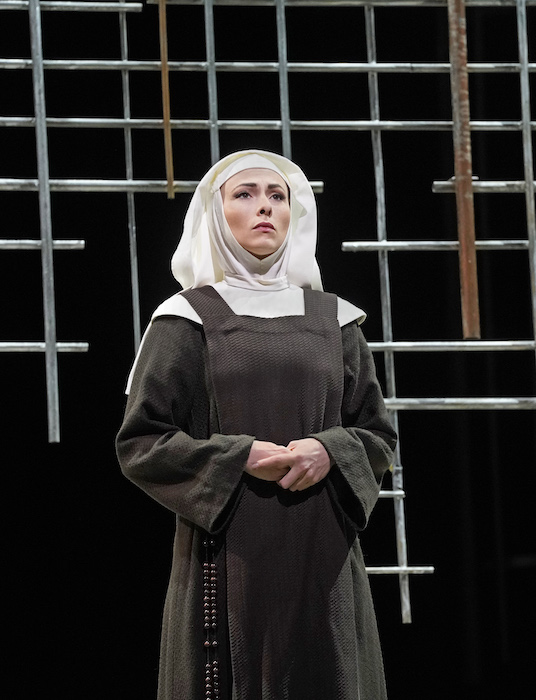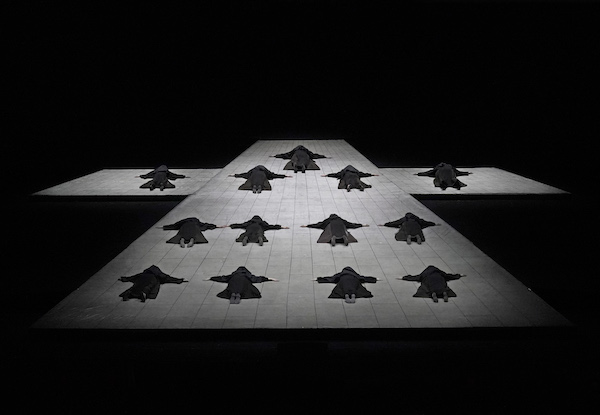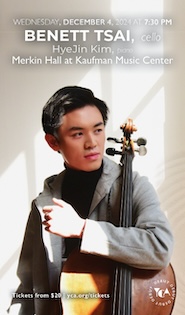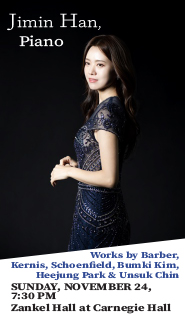Met closes season with a riveting, devastating “Carmélites”

Isabel Leonard is Blanche de la Force in Francis Poulenc’s “Dialogues des Carmélites” at the Metropolitan Opera. Photo: Ken Howard
The Metropolitan Opera has a habit of making a strong final impression: recent seasons have tended to close not with some splashy repertory staple, but with a short run of something unusual, a powerful performance of some rare gem that leaves you wishing it would get a longer showing.
This year’s closing act is Dialogues des Carmélites, Francis Poulenc’s 1956 opera portraying the Martyrs of Compiègne–sixteen Carmelite nuns sent to the guillotine in July 1794, in the final weeks of the Terror. In Friday night’s premiere, the weight of the piece was just about unbearable; anyone who wants to explore the darker end of opera’s emotional spectrum ought to rush to the final two performances before they sell out.
Poulenc wrote both the music and the libretto and the two merge seamlessly in a powerful study of devotion. Even in a time and place less attuned to the religious conviction of these characters, their breathtaking sacrifice and the vivid way that Poulenc realizes it in words and music make for a difficult but rewarding experience for any viewer.
The opera itself leaves an unforgettable final impression: justly celebrated is its closing “Salve regina” chorus, which loses one voice at a time as the sisters walk off to their execution, punctuated by the sound of a guillotine’s blade sliding thud. It’s here that Poulenc creates the greatest sonic intensity in the work, matching the emotion of the moment to overwhelming effect.
But this is a score rich with ravishing music, drawing distinct characters in the vocal writing and finding rich beauty in moments of deep feeling–such as the tearful final encounter between the novice Blanche de la Force and her brother, and especially the haunting “Ave Maria,” sung in mourning for the loss of the Reverend Mother. The women of the Met Chorus, playing the sisters of the order, sang with bright glow and rich resonance all night, making their hymns the musical highlights of the evening.
Leading this revival cast is mezzo-soprano Isabel Leonard, who has built herself a reputation as one of the finest singing actresses in opera today. Blanche de la Force, the newest sister of the order, is one of her darker roles, dramatically speaking, and her internal struggle of conscience was a stunning achievement.
Leonard’s Blanche seemed to be constantly on the edge of breaking, torn between fear and her faith, taking up a new way of life and quickly finding that it could cost her more than she imagined. Leonard has a gift for merging her vocal and dramatic characters into an integral whole: her warm, focused mezzo is adaptable to a wide variety of roles, and here its quickness seemed to reflect the conflicted feelings racing through Blanche’s mind.
When this work last appeared at the Met, back in 2013, it was with Leonard alongside Erin Morley, who also reprises her role as Blanche’s fellow novice Constance. While she does not leave as deep an impression as Blanche, she is the innocent conscience of the piece, kind and questioning in Morley’s committed portrayal. There is a natural cheer in the tart brightness of Morley’s soprano that mixed gorgeously with the many darker voices in the cast.
Madame de Croissy, the ailing mother superior of the convent, is often a vehicle for a mature singer: in this case we had Karita Mattila, still showing impressive body in her voice. Though the character is gone by the end of Act I, this role is crucial in establishing crises of faith as a central theme of the opera, which Mattila accomplished with her transfixing death scene, crying out in agony in her final moments.
Her successor is Madame Lidoine, sung with a firm caramel soprano by Adrianne Pieczonka. Yet it’s Mother Marie who truly becomes the moral guide of the order in its most fraught moment. Karen Cargill filled the role beautifully, combining fierceness of spirit with deep kindness and singing with a full sound of amber color.
David Portillo’s clear, airy tenor was an ideal fit for the Chevalier de la Force, Blanche’s brother, colorful and light at its top. Making his company debut as their father the Marquis, Jean-François Lapointe offered a noble if weary bearing and a hefty baritone. Tony Stevenson brought warm, tender singing to his simple phrases in his appearance as the chaplain, and Patrick Carfizzi’s forceful bass-baritone betrayed an officious cruelty as the jailer who pronounces the sentence of death.
Yannick Nézet-Séguin expertly balanced the score’s competing demands of lushness, brightness, and intensity, keeping them in thrilling tension. Here and there he fell into the habit of covering his singers, but it was hard to resist the richness and power of the sound, as the Met orchestra plays brilliantly for him, creating colorful textures and shaping the score with precision. It is an interesting and encouraging choice for Nézet-Séguin to wrap his first season as music director not with a well-worn favorite, but with an impressive reading of a difficult piece.
The 1977 John Dexter production, the only staging of the opera that the Met has ever had, achieves an enormous amount through mere suggestion. A raked stage in the shape of a cross makes up the entire playing space, depicting variously the nave and transept of a church, a prison, and—in its most powerful symbolic expression—the site of the nuns’ martyrdom. The rest is implied with sketch-like frames, be they the bars of an iron gate or a humble altar. Rarely has a set change carried with it more emotional weight than the hoisting of the church’s arches up into the flies.
It’s hard to imagine not being moved by a performance like this one. With such extraordinary musical values, combined with intelligent but evocative stagecraft, this Dialogues des Carmélties represents the Met at its very best. Would that it played more than three times.
Dialogues des Carmélites runs through May 11 at the Metropolitan Opera. metopera.org

Photo: Ken Howard




Posted May 09, 2019 at 8:59 am by Jack Firestone
It was truly everything the reviewer said it is. Heard last night. Equally as impressive. If you can’t get to the theater and it is sold out for Saturday, then pick up the broadcast in movie theater for the Met Live in HD of the Saturday matinee. You won’t be sorry.
Posted May 13, 2019 at 8:45 am by Louis T. Lipp
Breathtaking performance. You cannot take your eyes of Isabel Leonard’s face or your ears off her voice. This kind of perfection is what makes the Met the Met.
Posted May 17, 2019 at 12:57 pm by David Rohde
This is an inexact comparison, but nevertheless it’s interesting to look back at another heavy piece that Isabel Leonard did two years ago at the Met, Massenet’s Werther, which Eric Simpson also justifiably lauded. I saw that opera live at the Met, but the house was half full. For Carmelites, the place was obviously packed (in this case I wasn’t there myself but saw it at a movie theater in Virginia). It is entirely possible that opera stars can still be made and break out to the more general culture. I would argue that this is necessary, or at least that more of the Broadway crowd be tempted to come up to Lincoln Center once in a while.
In that vein, one of the many things that Isabel has going for her is that she does not “act” her roles, she inhabits them. That applies to both comic and tragic roles. This is more important to the general theater audience than people in the opera world may realize. Once again Eric Simpson, as I almost always feel, finds just the right words to express the impact of the music, the singers and the conductor.
Dialogues of the Carmelites was, pick your term, astounding-astonishing-devastating and I look forward to more such experiences in an uncertain time for opera. Thanks to New York Classical Review for this very well-done record of the event.